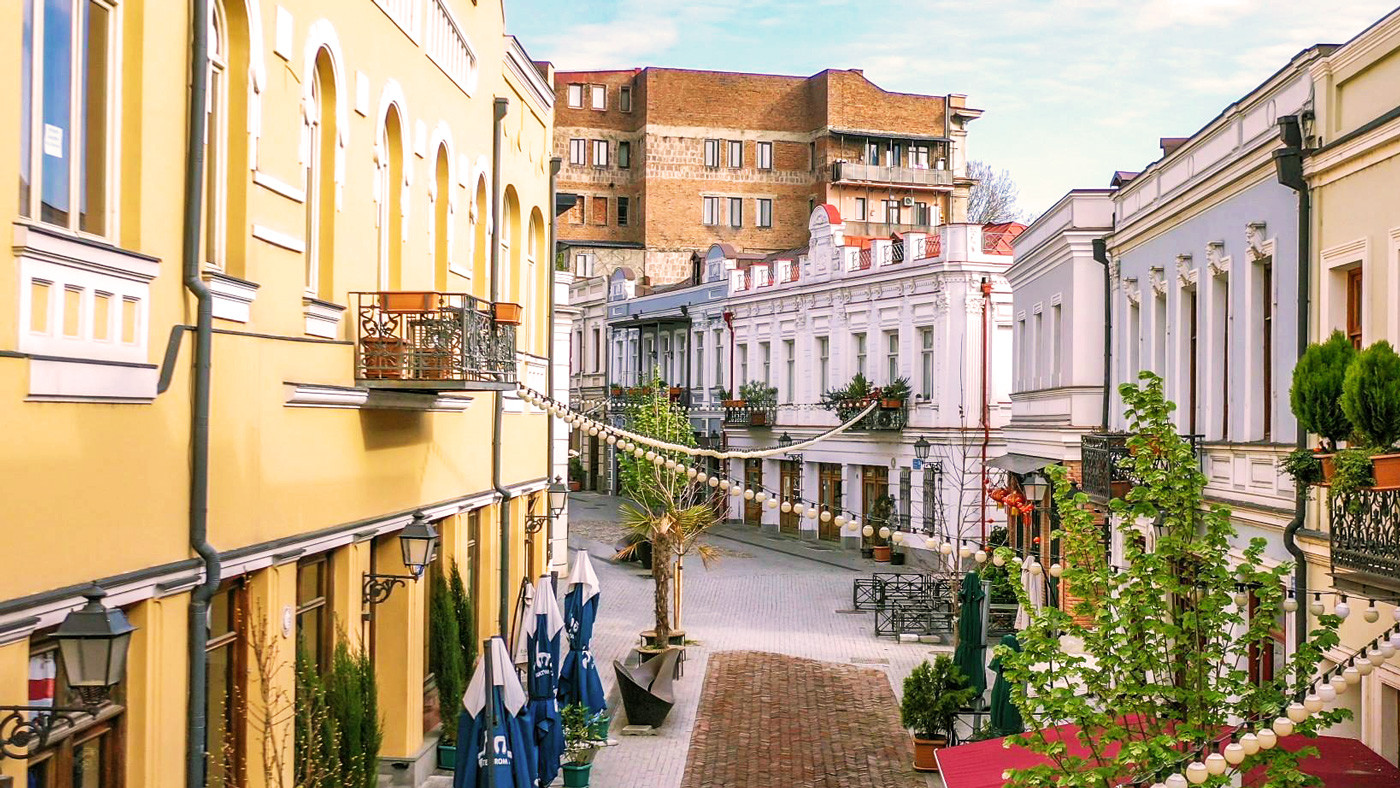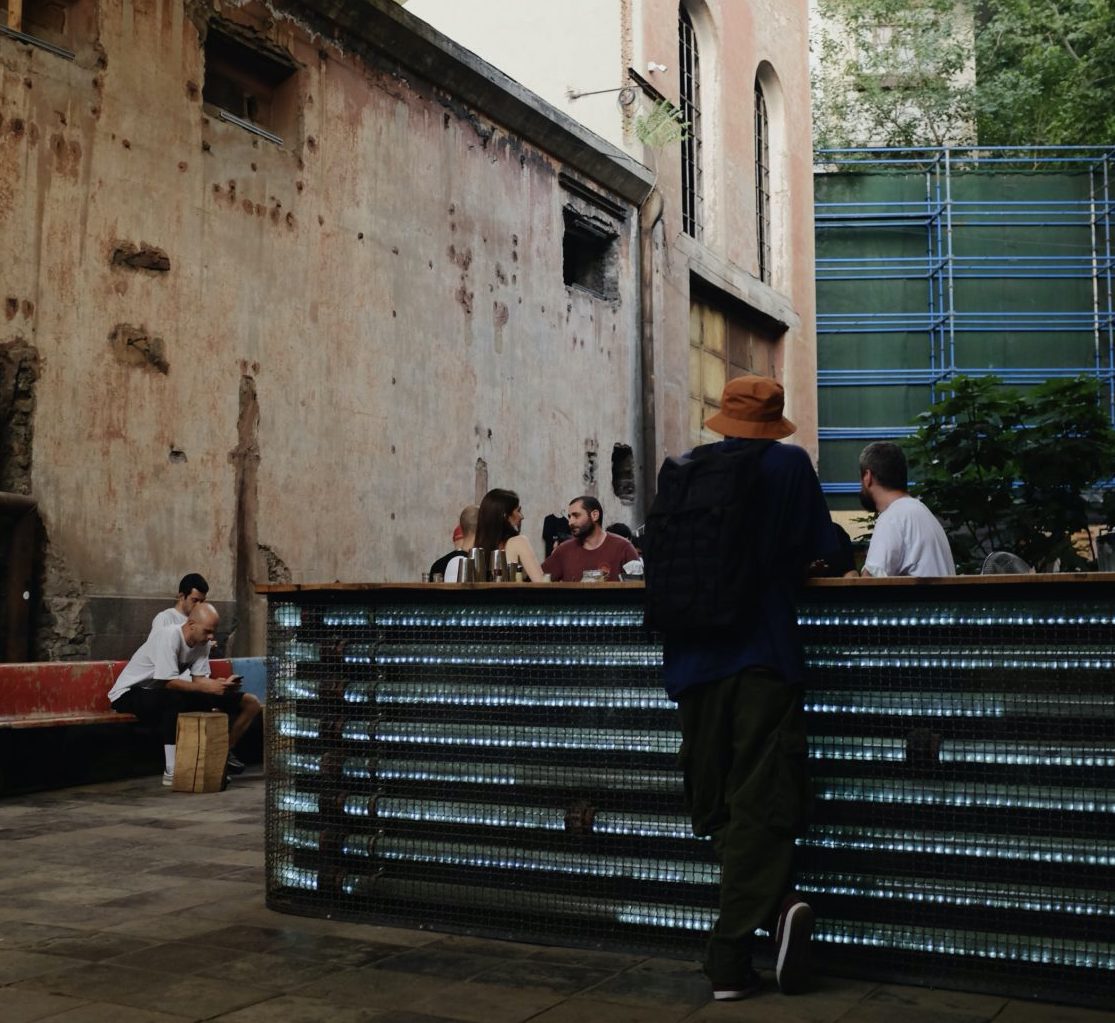Hello! Could you please introduce yourself, mention the organization you work for, and explain your role in the Slash Transition project?
Hi, I am Nino Davadze, an independent musician and radio person representing Mutant Radio in Georgia, Tbilisi. As a partner of the Slash Transition project, we are organizing local hub meetings, activities, and gathering enthusiasts interested in sound and urban development. Additionally, we contribute through our radio function and serve as media partners for Trempo, the head of the project. Our goal is to uphold a storytelling structure aligned with the radio format while supporting the values of the Slash Transition project.
Can you elaborate on how Mutant Radio operates and how you get involved in this initiative?
From a small community place and radio, Mutant Radio has formed an international platform, venue, and meeting place for Georgian and international artists. Being grown with international and local contributors and residents, it has become a venue and platform for networking, with a significant focus on its audio dimension. On a personal level, I became involved with Mutant Radio during the pandemic. I have a strong interest in radio arts, appreciating its democratic and non-judgmental nature. My broadcasts mainly cover topics related to gender politics, cultural politics, and social movements in Georgia.
What were the motivations for embarking on the Slash Transition project?
Recently, Mutant Radio has evolved into an international hub, fostering collaborations, introducing new music genres, and providing a platform for underrated yet impactful music. In this context, Mutant Radio has also begun to seek new opportunities and engage in European projects. That is how we joined Reset!, which is a European network for independent cultural and art organizations. Moreover, we are currently undergoing complex transitions that encompass political, economic, and cultural aspects. Our situation aligns with the Slash Transition project and the challenges faced by the partners in their respective cities.
How did you define the experimental territory for the artist-in-residency?
We had extensive discussions about selecting an area, as each district in Tbilisi is unique. Initially, we concentrated on the Mutant Radio neighborhood due to its proximity and familiarity. However, the project allowed us to expand our experimental scope, leading us to include the Chugureti district, which is now our main focus. Situated in the city center, Chugureti, once impoverished, has become popular, housing a diverse mix of people from the Middle East, Arab countries, Azerbaijan, Armenia, Georgia, Ukraine, and Russia, making it historically, architecturally, and culturally diverse. Moreover, Chugureti is positioned between a mountain and a river, contributing to its opulence and heterogeneity.
What is the main development of the neighborhood and its community at the moment?
If we consider the Mutant Radio neighborhood, for example, it serves as a cultural frontier with live sessions and a lot of experimental and contemporary music. It has become a cool and popular place for people from all over Tbilisi to gather. However, it is situated in a district that is culturally complex and not particularly economically prosperous, I must say. It is mainly developed by a private company, a businessman specifically, who is very open to sharing the spaces and providing opportunities for young people to showcase their art. This kind of economic support is essential for sustaining the arts, which may not be economically beneficial otherwise. The topic of gentrification is also on the table, considering the significant impact it has on Tbilisi and this neighborhood.
Lisbon and Nantes are grappling with gentrification as well. However, public authorities actively contribute to urban development and cultural initiatives. In contrast, in Tbilisi, the private sector plays a more significant role in support. Interestingly, regardless of public authorities' involvement or lack thereof, gentrification remains a prevalent issue.
Yes, that is true. In Georgia, the situation is quite extreme because cultural development doesn’t seem to be a priority on the governmental policy or public authority agenda. They do support art, but only in the realm of folk or classical forms, lacking support for anything contemporary or forward-looking that could be passed on to the next generation.
Who are the members of your local hub?
We have ten members, including Mutant Radio representatives. The hub includes independent musicians and representatives of different organizations, such as Indigo magazine, a respected storytelling platform that focuses on text and videos, highlighting Tbilisi’s current state and history, focusing on minority groups. Also part of the hub are the Contemporary Arts Center and the Creative Education Studio implanted in the neighborhood. We also have members contributing in architecture, Mariam Shergelashvili from the TAN_KHMOVANI platform about noise pollution and sound ecology initiated in 2023. Not to mention Giorgi Koberidze, a sound artist and electro-acoustic musician, Ben Wheeler who is musician, ethnomusicologist, researcher and co-founder of Ored Recordings, Keti Davitashvili from the conservatory and Ani Tavadze who is a journalist and LGBTQIIA+ activist.
What are your first observations regarding your territory of experimentation?
The river and its role have become a captivating subject for both the neighborhood and the hub. Our initial observations during sound walks and meetings have highlighted the intriguing relationship between the Mutant Radio neighborhood and the river. Despite its presence, the river seems overlooked in various contexts. Invited guests with expertise in the historical context of the Chugureti region will offer informative insights, guiding our focus.
During your meetings, were there topics that strongly united opinions, and were there others that sparked division or more debate related to the territory's transition?
Our discussions primarily found common ground on the issue of the lack of nature in Tbilisi, a widely acknowledged problem. However, opinions diverged on gentrification, particularly regarding the emergence of trendy places and their dual role. While appealing to visitors, locals question their authenticity and connection to the city’s deep-rooted culture. The debate revolves around the contrasting perspectives of preserving aesthetics and culture versus acknowledging uncomfortable living conditions in culturally preserved areas. The discussion challenges external, liberal voices that label gentrification without experiencing associated challenges, posing the question: if given the choice, would they endure the discomfort for the sake of preservation? This multifaceted conversation brings forth diverse views, highlighting the complexity of the matter.
One final question—considering your primary involvement as a partner focused on sound in the Slash Transition project, how do you approach and perceive your role in the initiative?
For us, it is all about sound. Our discussions delve deep into the audio dimension, with each question leading to another on how it manifests in sound. We consistently adhere to the power, showcase, and presentation of sound to convey understanding. Take, for instance, our recent meeting—a sound walk mapping the area with a focus on auditory triggers. While this approach is at the hub level, Mutant Radio, on the radio level, will extend this exploration to understand how other hubs perceive and share their experiences through sound. Collecting this material will shape a unique agenda, allowing project partners to immerse themselves in sound before collectively sharing the experience with a wider audience. As an organization, our role is to transmit information through audio media, locally and internationally.

Members of the local hub in Tbilisi: Indigo Magazine (storytelling platform), Shorisdebuli (Thoughts on void – project by Davit Beitrishvili and Aleksandre Gachechiladze developed in frames of @tbilisiarchitecturebiennial), Mariam Shergelashvili (TAN_KHMOVANI platform), CCA Tbilisi, CES, Ben Wheeler (co-founder of Ored Recordings), Keti Davitashvili (Technical specialist of folk lab at Tbilisi State Conservatoire), Giorgi Koberidze (electronic and classical music composer), Ani Tavadze (journalist, activist, member of Grlz waves movement), Nino Davdze (Mutant Radio).
Interview by Cécile Moroux

